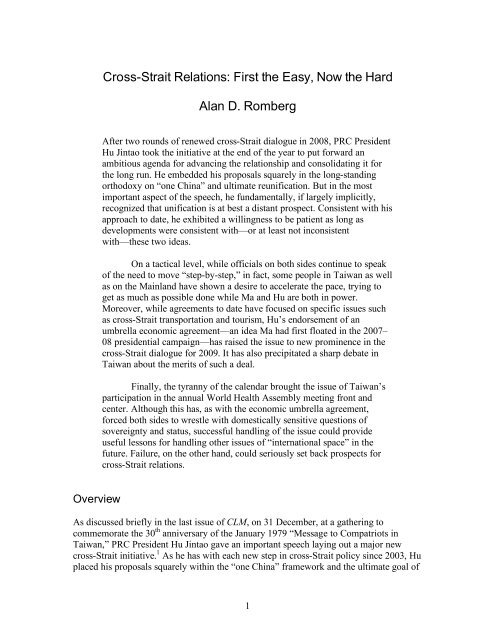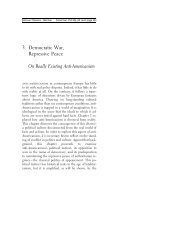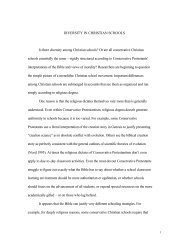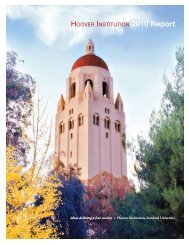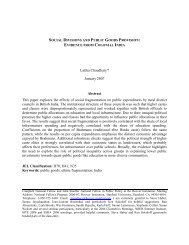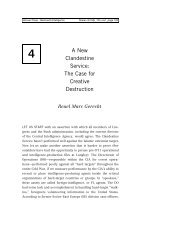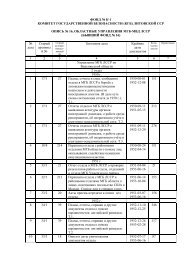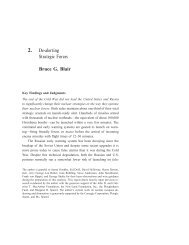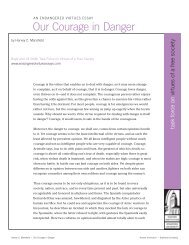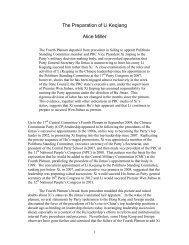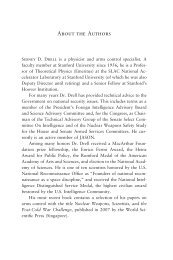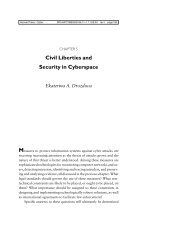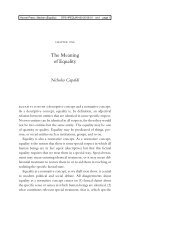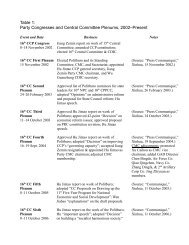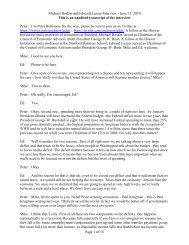Cross-Strait Relations: First the Easy, Now the Hard - GEES
Cross-Strait Relations: First the Easy, Now the Hard - GEES
Cross-Strait Relations: First the Easy, Now the Hard - GEES
You also want an ePaper? Increase the reach of your titles
YUMPU automatically turns print PDFs into web optimized ePapers that Google loves.
Overview<br />
<strong>Cross</strong>-<strong>Strait</strong> <strong>Relations</strong>: <strong>First</strong> <strong>the</strong> <strong>Easy</strong>, <strong>Now</strong> <strong>the</strong> <strong>Hard</strong><br />
Alan D. Romberg<br />
After two rounds of renewed cross-<strong>Strait</strong> dialogue in 2008, PRC President<br />
Hu Jintao took <strong>the</strong> initiative at <strong>the</strong> end of <strong>the</strong> year to put forward an<br />
ambitious agenda for advancing <strong>the</strong> relationship and consolidating it for<br />
<strong>the</strong> long run. He embedded his proposals squarely in <strong>the</strong> long-standing<br />
orthodoxy on “one China” and ultimate reunification. But in <strong>the</strong> most<br />
important aspect of <strong>the</strong> speech, he fundamentally, if largely implicitly,<br />
recognized that unification is at best a distant prospect. Consistent with his<br />
approach to date, he exhibited a willingness to be patient as long as<br />
developments were consistent with—or at least not inconsistent<br />
with—<strong>the</strong>se two ideas.<br />
On a tactical level, while officials on both sides continue to speak<br />
of <strong>the</strong> need to move “step-by-step,” in fact, some people in Taiwan as well<br />
as on <strong>the</strong> Mainland have shown a desire to accelerate <strong>the</strong> pace, trying to<br />
get as much as possible done while Ma and Hu are both in power.<br />
Moreover, while agreements to date have focused on specific issues such<br />
as cross-<strong>Strait</strong> transportation and tourism, Hu’s endorsement of an<br />
umbrella economic agreement—an idea Ma had first floated in <strong>the</strong> 2007–<br />
08 presidential campaign—has raised <strong>the</strong> issue to new prominence in <strong>the</strong><br />
cross-<strong>Strait</strong> dialogue for 2009. It has also precipitated a sharp debate in<br />
Taiwan about <strong>the</strong> merits of such a deal.<br />
Finally, <strong>the</strong> tyranny of <strong>the</strong> calendar brought <strong>the</strong> issue of Taiwan’s<br />
participation in <strong>the</strong> annual World Health Assembly meeting front and<br />
center. Although this has, as with <strong>the</strong> economic umbrella agreement,<br />
forced both sides to wrestle with domestically sensitive questions of<br />
sovereignty and status, successful handling of <strong>the</strong> issue could provide<br />
useful lessons for handling o<strong>the</strong>r issues of “international space” in <strong>the</strong><br />
future. Failure, on <strong>the</strong> o<strong>the</strong>r hand, could seriously set back prospects for<br />
cross-<strong>Strait</strong> relations.<br />
As discussed briefly in <strong>the</strong> last issue of CLM, on 31 December, at a ga<strong>the</strong>ring to<br />
commemorate <strong>the</strong> 30 th anniversary of <strong>the</strong> January 1979 “Message to Compatriots in<br />
Taiwan,” PRC President Hu Jintao gave an important speech laying out a major new<br />
cross-<strong>Strait</strong> initiative. 1 As he has with each new step in cross-<strong>Strait</strong> policy since 2003, Hu<br />
placed his proposals squarely within <strong>the</strong> “one China” framework and <strong>the</strong> ultimate goal of<br />
1
Romberg, China Leadership Monitor, No. 28<br />
reunification. He <strong>the</strong>n cast <strong>the</strong> six points of <strong>the</strong> initiative that he presented not as<br />
departures in policy but as appropriate adaptations to <strong>the</strong> positive changes in Taiwan<br />
since last year’s elections and <strong>the</strong> “new starting point in history” at which cross-<strong>Strait</strong><br />
relations have now arrived.<br />
Although <strong>the</strong> three main points of focus for 2009 were later identified as<br />
economic, cultural and educational, and personal exchanges (i.e., visits), 2 in fact <strong>the</strong>re is a<br />
general consensus in both Taipei and Beijing that <strong>the</strong> three most important proposals Hu<br />
put forward were for a comprehensive economic agreement, political dialogue and<br />
accommodation to Taiwan’s aspiration for “international space,” and dialogue to consider<br />
a mechanism to enhance mutual military trust—essentially what could be labeled<br />
confidence- and security-building mechanisms (CSBMs). 3<br />
But what was even more noteworthy than <strong>the</strong> specifics of <strong>the</strong>se proposals was that<br />
Hu’s speech tacitly—and perhaps not so tacitly—recognized <strong>the</strong> reality that reunification<br />
is not on <strong>the</strong> table at this point. Not only was his approach embedded in <strong>the</strong> context of <strong>the</strong><br />
current “un-unified status” being maintained “for a long time to come,” but none of <strong>the</strong><br />
proposals makes sense in <strong>the</strong> context of presumed near-term unification. Ra<strong>the</strong>r, <strong>the</strong>y are<br />
designed to foster, for <strong>the</strong> indefinite future, cross-<strong>Strait</strong> relationships that Beijing hopes<br />
will contribute to ultimate reunification even though <strong>the</strong> specific steps might not be<br />
explicitly or directly linked to that goal.<br />
Hu left no doubt that reunification remains <strong>the</strong> ultimate objective. But, ra<strong>the</strong>r than<br />
creating “litmus tests” for each step in terms of whe<strong>the</strong>r it promotes unification, and<br />
although he did not quite put it this way, <strong>the</strong> criterion <strong>the</strong> PRC leader established in<br />
practice was that each step should be consistent with—or at <strong>the</strong> very least not inconsistent<br />
with—that goal. 4<br />
Debates followed Hu’s proposal, both on Taiwan and on <strong>the</strong> Mainland, centered<br />
not only on <strong>the</strong> “what” and “how” of <strong>the</strong> six points, but also on <strong>the</strong> pace at which<br />
progress might be made. Central players on both sides of <strong>the</strong> <strong>Strait</strong> used almost identical<br />
language in arguing that things must proceed step by step. They continued to refer to <strong>the</strong><br />
agreement, reached shortly after Ma Ying-jeou’s election in spring 2008, to handle<br />
economic issues first, <strong>the</strong>n political and security ones: easy issues first, <strong>the</strong>n harder ones.<br />
None<strong>the</strong>less, Wang Yi, <strong>the</strong> minister-level director of <strong>the</strong> Mainland’s State Council<br />
Taiwan Affairs Office (TAO), recently said that, while <strong>the</strong> agreed pace and prioritization<br />
remain generally valid, in terms of economic relations “<strong>the</strong> preliminary thinking at this<br />
point is that we shall accelerate <strong>the</strong> institutionalization” of cross-<strong>Strait</strong> cooperation.<br />
Moreover, even with regard to o<strong>the</strong>r—political and security—issues, he said, “<strong>the</strong>re is no<br />
need for us to make a point of steering clear of sensitive issues.” 5<br />
On <strong>the</strong> Mainland, some of <strong>the</strong> impatience seems to come from those who assume<br />
that whatever is left undone when Hu steps down after finishing his second term in<br />
2012/2013 will languish for a considerable period of time as <strong>the</strong> next leader establishes<br />
his position and sets his priorities. And <strong>the</strong>y fear that this “delay” will last at least through<br />
most of <strong>the</strong> successor’s first five-year term, leaving a policy vacuum in which political<br />
2
Romberg, China Leadership Monitor, No. 28<br />
developments in Taiwan could bring new challenges. Perhaps even more important,<br />
while many in <strong>the</strong> PRC are concerned—or at <strong>the</strong> very least uncertain—about some<br />
aspects of Ma’s ambitions in cross-<strong>Strait</strong> relations and especially with respect to<br />
international space, Beijing wants at all costs (albeit within <strong>the</strong> “one China” context) to<br />
ensure Ma’s re-election in 2012 and prevent <strong>the</strong> DPP’s return to power.<br />
In Taiwan, judging by a variety of signs, including discussion of how and when<br />
<strong>the</strong> issue of a cross-<strong>Strait</strong> economic framework agreement will be approached (see<br />
below), <strong>the</strong> principal expressions of impatience would seem to be coming from President<br />
Ma himself.<br />
In any case, if progress is to be accelerated even on economic cooperation, it<br />
would appear that authorities on both sides have some work to do to allay concerns and<br />
generate support for <strong>the</strong> quicker pace. Again, Wang Yi seemed to recognize this point<br />
when he said that <strong>the</strong> terms of an overall economic agreement needed to be “supported by<br />
all circles on both sides” and that Beijing would not only take into account <strong>the</strong><br />
“reasonable demands” of Taiwan but also “take full account of <strong>the</strong> practical interests of<br />
<strong>the</strong> Taiwan public.” 6<br />
Although <strong>the</strong> general level of public support for Ma’s approach to cross-<strong>Strait</strong><br />
relations remains high, <strong>the</strong> concerns expressed by <strong>the</strong> DPP go across <strong>the</strong> board to include<br />
sovereignty, economic dependence, and even basic identity. Looking beyond <strong>the</strong><br />
immediate “international space” issue of Taiwan’s attendance at <strong>the</strong> May 2009 World<br />
Health Assembly (WHA) meeting, discussed below, Hu’s positive response to Ma’s<br />
proposal for a comprehensive economic framework agreement has risen to <strong>the</strong> top of <strong>the</strong><br />
heap of Hu’s six points as <strong>the</strong> first candidate for action.<br />
Hu’s 31 December Speech<br />
In <strong>the</strong> first half of Hu Jintao’s 31 December speech, great emphasis was placed on<br />
adherence to <strong>the</strong> “one China” principle as <strong>the</strong> only basis for peaceful development of<br />
cross-<strong>Strait</strong> relations, and on eventual reunification. But even as he articulated and<br />
embraced <strong>the</strong> orthodoxy of <strong>the</strong> past, in <strong>the</strong> second half of his talk Hu laid out six<br />
propositions that in tone and nuance suggested possible future flexibility in<br />
implementation: 7<br />
1. Scrupulously abide by <strong>the</strong> “one China” principle and enhance political mutual trust<br />
In this section, Hu stressed <strong>the</strong> “core interest” in “safeguarding national sovereignty and<br />
territorial integrity” and of continuing to oppose “Taiwan independence.” He argued that<br />
<strong>the</strong> lack of unification is not a state of division of Chinese territory and sovereignty but “a<br />
state of political antagonism.” Having thus defined <strong>the</strong> “issue” that needed to be resolved,<br />
he <strong>the</strong>n laid out a pathway for moving ahead. Since it was clear that <strong>the</strong> two sides were<br />
not going to come to a common understanding on <strong>the</strong> meaning of “one China,” his<br />
proposal focused instead on developing a common understanding on how to safeguard<br />
3
Romberg, China Leadership Monitor, No. 28<br />
5. Safeguard national sovereignty and hold consultations on external affairs<br />
Beyond expressing what also comes across as a somewhat paternalistic call for <strong>the</strong> PRC’s<br />
overseas diplomatic missions to streng<strong>the</strong>n ties with “Taiwan compatriots” and “help<br />
<strong>the</strong>m solve <strong>the</strong>ir practical difficulties in earnest,” Hu reiterated awareness of <strong>the</strong> feelings<br />
of people in Taiwan about participation in international activities, adding: “we attach<br />
importance to <strong>the</strong> settlement of related issues.” Having called for fur<strong>the</strong>r consultation “as<br />
needed” on Taiwan’s unofficial economic and cultural interactions with o<strong>the</strong>r countries,<br />
he <strong>the</strong>n went on to say that, with regard to participation in international organizations,<br />
“fair and reasonable arrangements can be made through pragmatic consultation between<br />
<strong>the</strong> two sides, provided that this does not give rise to ‘two Chinas’ or ‘one China and one<br />
Taiwan.’”<br />
At <strong>the</strong> end of this paragraph, Hu abruptly inserted <strong>the</strong> sentence: “Settling <strong>the</strong><br />
Taiwan question and realizing <strong>the</strong> complete reunification of <strong>the</strong> country is an internal<br />
affair of China and is not subject to interference by any foreign forces” [in traditional<br />
rendering: “brooks no foreign interference”]. 9 This statement was reportedly met with<br />
loud applause. 10<br />
6. End <strong>the</strong> state of hostility and reach a peace agreement<br />
Under this proposal, Hu made two very intriguing points. <strong>First</strong>: “In <strong>the</strong> interest of<br />
conducting consultation and negotiation across <strong>the</strong> <strong>Strait</strong> and making arrangements for<br />
<strong>the</strong>ir interactions, <strong>the</strong> two sides can hold pragmatic exploratory discussions on <strong>the</strong>ir<br />
political relationship in <strong>the</strong> special context where <strong>the</strong> country has not yet been<br />
reunified.” 11<br />
And second: “In <strong>the</strong> interest of stabilizing <strong>the</strong> situation across <strong>the</strong> Taiwan <strong>Strait</strong><br />
and mitigating military security apprehensions, <strong>the</strong> two sides can, in due course, engage<br />
and exchange with each o<strong>the</strong>r on military issues and hold exploratory discussions on <strong>the</strong><br />
issue of establishing a mechanism of mutual trust for military security.” 12<br />
He <strong>the</strong>n closed with a renewed “appeal,” on <strong>the</strong> basis of <strong>the</strong> “one China”<br />
principle, to formally end <strong>the</strong> state of hostility across <strong>the</strong> <strong>Strait</strong> through consultation,<br />
reach a peace agreement, and build a framework for <strong>the</strong> peaceful development of cross-<br />
<strong>Strait</strong> relations.<br />
To ensure Hu’s proposals and <strong>the</strong>ir importance were understood properly, his<br />
speech was immediately followed up by supplementary explications by senior officials.<br />
TAO Director Wang Yi explained that while “principle and policy” toward Taiwan have<br />
been consistent, <strong>the</strong>y also “are able to advance with <strong>the</strong> times . . . and are developing.” He<br />
said that <strong>the</strong> “<strong>the</strong>oretical significance” of <strong>the</strong> speech is <strong>the</strong> formation of <strong>the</strong> “newest<br />
<strong>the</strong>oretical achievement on <strong>the</strong> basis of continuous development” of <strong>the</strong> central<br />
authorities’ principles and policies developed over <strong>the</strong> past 30 years, and that its<br />
“practical significance” is in pointing out <strong>the</strong> direction for development of cross-<strong>Strait</strong><br />
relations from <strong>the</strong> “new historic starting point”: “The speech points out a clear direction<br />
5
Romberg, China Leadership Monitor, No. 28<br />
years-long period of high risks in <strong>the</strong> Taiwan <strong>Strait</strong>’s situation ended.” But Chen also<br />
picked up on <strong>the</strong> ubiquitous <strong>the</strong>me that, “for now and for a period to come, ‘Taiwan<br />
independence’ forces are still <strong>the</strong> largest actual threat to <strong>the</strong> peaceful development of<br />
cross-<strong>Strait</strong> relations” and, to eliminate <strong>the</strong> “poisonous harm” of <strong>the</strong>ir ideology on <strong>the</strong><br />
Taiwan public, “we still need to make great efforts.” 20<br />
But even beyond that, Chen acknowledged, as had Hu, that “<strong>the</strong>re still remain<br />
certain inherent contradictions and problems across <strong>the</strong> Taiwan <strong>Strait</strong> in political, military<br />
and external affairs.” He said Hu had already indicated in his speech <strong>the</strong> direction both<br />
sides needed to strive on a joint basis and through consultations “on an equal footing” to<br />
gradually work out solutions to those problems “in a constructive and future-oriented<br />
manner.” 21<br />
Taipei’s official reaction to <strong>the</strong> Hu speech has been cautious but generally<br />
welcoming. Within hours of <strong>the</strong> speech, <strong>the</strong> Mainland Affairs Council (MAC) issued a<br />
statement reaffirming Taipei’s commitment to improved relations under <strong>the</strong> Republic of<br />
China constitution, i.e., maintenance of <strong>the</strong> status quo. 22 The MAC statement called for<br />
continued progress in cross-<strong>Strait</strong> relations on <strong>the</strong> basis of Ma Ying-jeou’s “three noes”—<br />
no unification, no independence, and no use of force—“in an orderly manner through <strong>the</strong><br />
institutionalized negotiation mechanism between <strong>the</strong> two sides based on <strong>the</strong> principles of<br />
‘equality and dignity.’” Expressing some caution, MAC noted that issues related to a<br />
peace accord and CSBMs could be deliberated “once a sufficient degree of mutual trust<br />
has been established in cross-<strong>Strait</strong> relations.” It placed emphasis for <strong>the</strong> near term on<br />
economic and cultural exchanges and negotiations, noting that <strong>the</strong>y could contribute to<br />
<strong>the</strong> development of such mutual trust. MAC closed with a call urging <strong>the</strong> Mainland<br />
authorities to “deeply understand <strong>the</strong> Taiwan people’s expectations and need in<br />
participating in <strong>the</strong> international community”—a pretty direct reference to <strong>the</strong> priority<br />
Taipei assigned to <strong>the</strong> WHA issue—and to extend <strong>the</strong> idea of “peaceful development” to<br />
cross-<strong>Strait</strong> interaction in <strong>the</strong> international, military and political spheres.<br />
The presidential office in Taipei also reacted within days with a general statement<br />
that seemed forward-leaning, welcoming <strong>the</strong> fact that both sides of <strong>the</strong> <strong>Strait</strong> were<br />
promoting cross-<strong>Strait</strong> consultations and exchanges under <strong>the</strong> <strong>the</strong>me of “peaceful<br />
development.” 23 It praised <strong>the</strong> “new thinking and pragmatism” shown in <strong>the</strong> Mainland’s<br />
policy toward Taiwan in recent years “under <strong>the</strong> leadership of General-Secretary Hu<br />
Jintao.” By <strong>the</strong> time this statement was issued, however, domestic concerns about falling<br />
into a PRC trap were already being loudly voiced, and <strong>the</strong> statement noted: “Taiwan is a<br />
pluralistic democratic society, and people have different views toward <strong>the</strong> future of<br />
Taiwan. We must respect <strong>the</strong>se different political advocacies and political views.” It<br />
stressed that, under Ma, Taipei had consistently operated on <strong>the</strong> basis of defending <strong>the</strong><br />
sovereignty of <strong>the</strong> Republic of China, upholding Taiwan’s dignity, and putting Taiwan’s<br />
interests first under <strong>the</strong> “1992 Consensus” and <strong>the</strong> principle of “mutual non-denial.”<br />
Reiterating <strong>the</strong> administration’s basic mantra of “no unification, no independence and no<br />
use of force,” it called for building trust and overcoming obstacles through “greater<br />
wisdom, understanding, creativity and flexibility.”<br />
It seemed evident on <strong>the</strong> Taiwan side at <strong>the</strong> time that Ma Ying-jeou was planning<br />
7
Romberg, China Leadership Monitor, No. 28<br />
to make a direct response within a few weeks, and on <strong>the</strong> PRC side it was clear <strong>the</strong>y were<br />
looking for one—one that would be positive. 24 Ma personally saw various aspects of<br />
Hu’s proposals as a “concrete response” to Taiwan’s desire for reconciliation and to some<br />
specific ideas that Ma himself had initially put forth. But even <strong>the</strong>n he indicated that<br />
Taiwan had to understand more clearly <strong>the</strong> detailed content and policy implications of<br />
what Hu was proposing. 25 And he wanted to make clear that he would listen to <strong>the</strong><br />
domestic voices raised in criticism and that, by doing so, he would convince people that<br />
he would never sacrifice Taiwan’s interests. 26<br />
In fact, however, Ma did not immediately issue a direct response to Hu, although<br />
he is now reported to be planning to do so during a videoconference link with American<br />
think tanks in late April. 27 His decision not to respond immediately was apparently part<br />
of a strategy to take <strong>the</strong> initiative to address <strong>the</strong> issue on Taipei’s own terms and at a time<br />
of its own choosing, ra<strong>the</strong>r than in <strong>the</strong> context of <strong>the</strong> anniversary of <strong>the</strong> “Message to<br />
Compatriots.” But it also seemed to have been importantly conditioned by domestic<br />
politics. The DPP chair, Tsai Ing-wen, had quickly taken <strong>the</strong> position that Hu’s speech<br />
showed Beijing had not changed its stance on issues of sovereignty and was, if anything,<br />
less flexible than before. She described <strong>the</strong> six-point proposal as detrimental to Taiwan’s<br />
sovereignty and charged that, in a series of retreats, <strong>the</strong> KMT’s position on “one China,<br />
respective interpretations” had first taken a step back to become <strong>the</strong> “1992 Consensus”<br />
and now had taken a step even fur<strong>the</strong>r back and had become identical to <strong>the</strong> PRC’s “one<br />
China principle.” 28<br />
And over time, as controversy has mounted within Taiwan over <strong>the</strong> substance of<br />
any response, <strong>the</strong> tone from <strong>the</strong> administration has become more openly skeptical. In<br />
early February, for example, a senior MAC official commented critically on Hu’s<br />
emphasis on retaining <strong>the</strong> “one China” principle and <strong>the</strong> PRC leader’s insistence on<br />
negotiating <strong>the</strong> end to cross-<strong>Strait</strong> hostilities and reaching a peace accord on <strong>the</strong> basis of<br />
that principle. 29<br />
“One China”<br />
Before moving on to discuss <strong>the</strong> major specific issues currently on <strong>the</strong> cross-<strong>Strait</strong><br />
agenda, it may be worth taking a moment to consider <strong>the</strong> dilemma that both sides face in<br />
handling <strong>the</strong> “one China” issue—<strong>the</strong> basis for any serious progress in managing cross-<br />
<strong>Strait</strong> relations in <strong>the</strong> foreseeable future.<br />
Ma has endorsed a very specific definition of “one China” that takes <strong>the</strong> form of<br />
“one China, respective interpretations.” He notes that this position is grounded in <strong>the</strong><br />
ROC constitution and that <strong>the</strong> “one China” he refers to is <strong>the</strong> Republic of China. The<br />
“respective interpretations” is simply a reflection of <strong>the</strong> reality that has underlain cross-<br />
<strong>Strait</strong> dealings since 1992, that is, that Beijing cannot accept his definition any more than<br />
Taiwan can accept <strong>the</strong> PRC’s. But even setting aside this irreconcilable difference with<br />
Beijing, if Ma were to accept agreements explicitly based on acceptance of “one China,”<br />
he would, as we have already seen, be pummeled domestically for allegedly ei<strong>the</strong>r<br />
8
Romberg, China Leadership Monitor, No. 28<br />
accepting <strong>the</strong> PRC’s definition or at least starting down <strong>the</strong> slippery slope to doing so. 30<br />
Similarly, although <strong>the</strong> PRC insists that cross-<strong>Strait</strong> relations must proceed under<br />
<strong>the</strong> signboard of its own “one China principle,” if it insists that Taipei accept this as <strong>the</strong><br />
basis for any agreement, or, as we have said, even that “one China” without fur<strong>the</strong>r<br />
definition is <strong>the</strong> basis, <strong>the</strong>n Taiwan will be unable to come to terms.<br />
The “solution” appears to be to continue on as at present. That is, while in a<br />
domestic context, each leadership will apply its own definition and <strong>the</strong> o<strong>the</strong>r side will<br />
simply “live with” that, and in cross-<strong>Strait</strong> dealings both will adhere to <strong>the</strong> mutually<br />
acceptable but vague “1992 Consensus,” which each continues to define in its own way.<br />
That said, specific agreements cannot be described as having been negotiated under <strong>the</strong><br />
rubric of “one China,” no matter by whose definition. To some extent this creates<br />
vulnerabilities for both leaderships from domestic elements who will accuse <strong>the</strong>m of<br />
kowtowing to <strong>the</strong> o<strong>the</strong>r side and not standing up for principle. But it is really <strong>the</strong> only<br />
basis for advancing cross-<strong>Strait</strong> relations, and it provides a way for both sides to achieve<br />
results that <strong>the</strong>y feel are in <strong>the</strong>ir own national interest without yielding on principle.<br />
In <strong>the</strong> long run, should negotiations turn to <strong>the</strong> ultimate resolution of <strong>the</strong> cross-<br />
<strong>Strait</strong> relationship, this will require adoption of some o<strong>the</strong>r approach that both sides can<br />
endorse. But that long run will be very long, indeed, and <strong>the</strong>re is not much point in<br />
speculating on what such a formulation might look like.<br />
The World Health Assembly<br />
In his 1995 “eight-point proposal,” General Secretary Jiang Zemin briefly addressed <strong>the</strong><br />
question of “international space” for Taiwan as follows:<br />
We do not have objections to <strong>the</strong> development of nongovernmental<br />
economic and cultural ties between Taiwan and o<strong>the</strong>r countries. According<br />
to <strong>the</strong> principle of one China and <strong>the</strong> characters of international<br />
organizations concerned, Taiwan has joined <strong>the</strong> Asian Development Bank,<br />
<strong>the</strong> Asian-Pacific Economic Cooperation Forum and o<strong>the</strong>r international<br />
economical organizations in <strong>the</strong> name of “Chinese Taibei [sic].” However,<br />
we oppose Taiwan’s activities in “expanding its living space<br />
internationally,” aimed at creating “two Chinas” or “one China, one<br />
Taiwan.” 31<br />
At <strong>the</strong> 16 th Party Congress in 2002, Jiang expanded on <strong>the</strong> point:<br />
On <strong>the</strong> basis of <strong>the</strong> one-China principle, let us shelve for now certain<br />
political disputes and resume <strong>the</strong> cross-straits dialogue and negotiations as<br />
soon as possible. On <strong>the</strong> premise of <strong>the</strong> one-China principle, all issues can<br />
be discussed. We may discuss how to end <strong>the</strong> cross-straits hostility<br />
formally. We may also discuss <strong>the</strong> international space in which <strong>the</strong> Taiwan<br />
9
Romberg, China Leadership Monitor, No. 28<br />
The problem would come if Beijing asserted again, as in <strong>the</strong> IHR case, that <strong>the</strong><br />
PRC is really “<strong>the</strong> decider” in this case based on its “sovereign right” to be <strong>the</strong> sole legal<br />
international representative of all of China and all <strong>the</strong> Chinese people, including those in<br />
Taiwan. This not only would be unnecessary but, given <strong>the</strong> political importance of <strong>the</strong><br />
WHA issue in Taiwan, wholly counterproductive.<br />
It would be far more useful if both <strong>the</strong> WHO and Beijing could agree to simply<br />
say <strong>the</strong> former had consulted with all concerned parties, including <strong>the</strong> PRC, and gotten<br />
unanimous agreement to invite Taiwan. And Taipei also would need to exercise<br />
discipline to stick with <strong>the</strong> fact that <strong>the</strong> invitation would have come from <strong>the</strong> WHO/WHA<br />
and avoid a repetition of <strong>the</strong> sort of “China has nothing to do with it” language used in<br />
<strong>the</strong> IHR case.<br />
Regarding <strong>the</strong> “status” in which Taipei would be invited to participate, Ma Yingjeou<br />
explicitly—and unsurprisingly—has ruled out “associate membership” in <strong>the</strong> WHA<br />
(which clearly would allow it to attend <strong>the</strong> WHA meeting), since this would require<br />
subordination to PRC sovereignty. 44 Despite attempts by some political opponents to<br />
claim this was <strong>the</strong> basis on which Ma was seeking attendance at <strong>the</strong> WHA, 45 it never was<br />
and obviously could not be. The most likely provision of <strong>the</strong> WHO Constitution that<br />
would apply to <strong>the</strong> Taiwan case would be Chapter V, Article 18 (h), which provides that<br />
among <strong>the</strong> functions of <strong>the</strong> WHA shall be<br />
to invite any organization, international or national, governmental or nongovernmental,<br />
which has responsibilities related to those of <strong>the</strong><br />
Organization, to appoint representatives to participate, without right of<br />
vote, in its meetings or in those of <strong>the</strong> committees and conferences<br />
convened under its authority, on conditions prescribed by <strong>the</strong> Health<br />
Assembly; but in <strong>the</strong> case of national organizations, invitations shall be<br />
issued only with <strong>the</strong> consent of <strong>the</strong> Government concerned. 46<br />
But even this approach could raise a question about China’s role (<strong>the</strong><br />
“Government concerned”), leading some to argue that <strong>the</strong>re ought to be a way to invite<br />
Taiwan under what might be termed “general custom” and not under a particular<br />
provision. Such an approach would avoid <strong>the</strong> potential awkwardness of <strong>the</strong> “Government<br />
concerned” issue while not compromising anyone’s position on sovereignty, including<br />
Beijing’s. It is not clear, however, how—or if—this could be worked out. Presumably<br />
such questions will be pursued when formal talks on <strong>the</strong> WHA issue take place in April<br />
in an as yet unannounced location “overseas.” 47<br />
Ano<strong>the</strong>r point Taipei will apparently raise in those talks is concern about <strong>the</strong> 2005<br />
Memorandum of Understanding between <strong>the</strong> PRC and <strong>the</strong> WHO Secretariat, under which<br />
Beijing essentially has to rule on every proposal by Taipei to participate in any WHOrelated<br />
activity. 48 Common sense would seem to dictate that while no one should expect<br />
<strong>the</strong> PRC to cancel <strong>the</strong> MOU, it could suspend it as long as Hu’s criteria on no “two<br />
Chinas” or “one China, one Taiwan” were met. Whe<strong>the</strong>r Beijing can bring itself to do so<br />
remains to be seen, but in <strong>the</strong> battle for hearts and minds in Taiwan it would seem to be a<br />
12
wise and even obvious step to take.<br />
Romberg, China Leadership Monitor, No. 28<br />
If against all expectations <strong>the</strong> WHA negotiation were to fail, Foreign Minister Ou<br />
has said that Taiwan would <strong>the</strong>n move back to <strong>the</strong> path of seeking UN membership. 49<br />
More important, Ma has reiterated his frequently expressed point that continued isolation<br />
in <strong>the</strong> international community would make it difficult to develop cross-<strong>Strait</strong> relations. 50<br />
These are not new positions, and <strong>the</strong>ir repetition may rankle some in Beijing. But<br />
somewhat new, and perhaps even more upsetting, was Ou’s reported suggestion that if<br />
Taiwan succeeds in its efforts to attend this year’s WHA meeting as an “observer,” it will<br />
<strong>the</strong>n work toward full WHO membership. 51 If this report is accurate, it would seem to be<br />
at sharp odds with <strong>the</strong> <strong>the</strong>me of reassurance to Beijing coming out of <strong>the</strong> presidential<br />
office that WHA observership will not start a fall of o<strong>the</strong>r dominoes. Clearly WHA is not<br />
<strong>the</strong> last step in <strong>the</strong> “international space” process, but raising WHO “full membership”<br />
flies directly in <strong>the</strong> face of Ma’s approach of avoiding sovereignty questions.<br />
The DPP will no doubt find fault with virtually any terms. But in formulating its<br />
formal position, <strong>the</strong> party has taken care not to paint itself entirely into a corner where it<br />
is protesting while <strong>the</strong> majority of people in Taiwan are satisfied. Thus, <strong>the</strong> party’s fourpoint<br />
resolution on <strong>the</strong> WHA adopted in late March was carefully formulated. It stated<br />
that <strong>the</strong> DPP: 52<br />
• did not accept <strong>the</strong> secret May 2005 PRC-WHO Secretariat MOU that subordinated<br />
Taiwan’s participation in WHO under China;<br />
• opposed having WHA information being forwarded to Taiwan via <strong>the</strong> PRC;<br />
• did not accept a situation where <strong>the</strong> PRC would annually be able to control whe<strong>the</strong>r<br />
Taiwan could participate in WHA activities; and<br />
• did not accept Taiwan participating as an “associate member” of <strong>the</strong> WHO under<br />
PRC sovereignty.<br />
The first three points are virtually universally agreed in Taiwan, including by <strong>the</strong><br />
Ma administration. The issue is whe<strong>the</strong>r Taiwan’s inability to do anything to remedy one<br />
or more of <strong>the</strong>m means that <strong>the</strong> party advocates not accepting an invitation to WHA. This<br />
would seem not to be a winning position, and <strong>the</strong> DPP is not likely to go that far. As<br />
already indicated regarding <strong>the</strong> fourth point, <strong>the</strong> Ma administration, by all appearances,<br />
has never considered “associate membership”—for <strong>the</strong> same reason that <strong>the</strong> DPP objects<br />
to it, namely, <strong>the</strong> implication of subordination to Beijing.<br />
The DPP has also implicitly attacked <strong>the</strong> idea of participating under <strong>the</strong> name<br />
“Chinese Taipei.” But, again, while it will predictably attack <strong>the</strong> Ma administration for<br />
undermining Taiwan’s sovereignty by going along with <strong>the</strong> name, if that is <strong>the</strong> final title<br />
used, it seems unlikely―given <strong>the</strong> DPP administration’s willingness to apply to WHA<br />
(unsuccessfully, as it turned out) as a “health entity” or “health region”―that it would go<br />
so far as to argue that <strong>the</strong> Ma administration should be rebuffed for accepting an<br />
arrangement that actually works and that does not accept PRC sovereignty. Of course, at<br />
this writing at <strong>the</strong> beginning of April, all of that remains to be seen.<br />
13
Diplomatic Truce<br />
Romberg, China Leadership Monitor, No. 28<br />
Ano<strong>the</strong>r related area where Taipei seems to be having trouble getting its talking points<br />
toge<strong>the</strong>r is in connection with indications that <strong>the</strong> newly elected government of El<br />
Salvador may want to establish diplomatic relations with <strong>the</strong> PRC. Officials in Taipei<br />
have been scrambling to come up with strategies to prevent that from happening. At first,<br />
however, <strong>the</strong> foreign minister was reported to have said that, while he hoped that El<br />
Salvador would not switch recognition, Taipei would not oppose such a step 53 or cut off<br />
ties with El Salvador “of our own accord,” 54 if that country established relations with <strong>the</strong><br />
PRC.<br />
This led to speculation that Taipei would try to hold out for a “dual recognition”<br />
approach. The foreign ministry quickly clarified that what Ou meant was not that Taipei<br />
would not oppose a diplomatic switch or that, if it happened, it would seek “dual<br />
recognition,” but that Taipei would work hard to lead <strong>the</strong> new Salvadoran leader to “fully<br />
understand” all of <strong>the</strong> cooperative approaches between El Salvador and Taiwan so that he<br />
would not switch recognition, but that it had no objection to El Salvador streng<strong>the</strong>ning<br />
economic relations with <strong>the</strong> Mainland. 55 A presidential spokesman went quite far in <strong>the</strong><br />
o<strong>the</strong>r direction, saying that Taiwan could “of course not accept” dual recognition. 56<br />
More logically, in emphasizing <strong>the</strong> next day that under <strong>the</strong> “diplomatic truce”<br />
strategy he was not pursuing “dual recognition,” Ma did not say he would refuse to<br />
accept it were it to evolve. What he did say, however, was that it was “too impractical” to<br />
go after (or expect) such an outcome, as it created more problems than it solved. 57 And<br />
<strong>the</strong> foreign ministry in Beijing reinforced <strong>the</strong> wisdom of this judgment by stating, in<br />
answer to a question about El Salvador, that “No matter how <strong>the</strong> situation changes, <strong>the</strong><br />
one-China principle will remain unchanged,” 58 a clear if implicit rebuttal of “dual<br />
recognition.”<br />
Still, and of greater operational interest, consistent with <strong>the</strong> apparent tacit<br />
“diplomatic truce” that has denied Paraguay <strong>the</strong> ability to switch recognition, 59 <strong>the</strong> PRC<br />
foreign ministry spokesman went on to address <strong>the</strong> issue in terms that implied a<br />
Salvadoran switch was not in <strong>the</strong> cards ei<strong>the</strong>r:<br />
Despite <strong>the</strong> absence of diplomatic ties, <strong>the</strong> Chinese people have friendly<br />
feelings towards <strong>the</strong> Salvador people, and we are willing to carry out<br />
friendly exchanges and mutually-beneficial cooperation in various areas<br />
with Salvador in line with <strong>the</strong> principles mentioned. 60<br />
An Economic Framework Agreement<br />
As <strong>the</strong> Taiwan economy has continued to struggle, 61 and as <strong>the</strong> PRC has continued to<br />
take steps to help Taiwan firms operating in <strong>the</strong> Mainland, 62 <strong>the</strong> most urgent cross-<strong>Strait</strong><br />
economic issue has become <strong>the</strong> prospect of an umbrella economic accord. Although <strong>the</strong><br />
exact nature of <strong>the</strong> proposed agreement proved to be something of a moving target during<br />
14
Romberg, China Leadership Monitor, No. 28<br />
<strong>the</strong> presidential election campaign, basically <strong>the</strong> idea of such an accord has been a part of<br />
Ma’s program since that time. 63 In his inaugural, in calling for resumption of dialogue on<br />
<strong>the</strong> basis of <strong>the</strong> “1992 Consensus,” Ma said: “The normalization of economic and cultural<br />
relations is <strong>the</strong> first step to a win-win solution.” 64<br />
None<strong>the</strong>less, discussion of an agreement seemed to lag in <strong>the</strong> early months of <strong>the</strong><br />
Ma administration, as <strong>the</strong> first two SEF-ARATS meetings focused on much more specific<br />
topics such as charter passenger flights, tourism, and direct shipping and air cargo links.<br />
As we observed last fall, any consideration of negotiating a Comprehensive Economic<br />
Cooperation Agreement (CECA) appeared to be in abeyance until experience could be<br />
gained with implementation of some of <strong>the</strong> specific arrangements. 65 But as we also noted<br />
at <strong>the</strong> time, Ma indicated that work had already begun on what a CECA might look like,<br />
because its eventual adoption would be important to help achieve <strong>the</strong> “normalization” of<br />
cross-<strong>Strait</strong> trade that he had called for and to avoid Taiwan’s marginalization as Asian<br />
economic regionalism took hold.<br />
During his trip to Taipei in November, ARATS president Chen Yunlin observed<br />
that once progress had been made on <strong>the</strong> “three links,” ARATS and SEF would discuss<br />
financial cooperation and “<strong>the</strong> normalization of economic ties,” 66 a phrase that featured<br />
prominently in Hu Jintao’s 31 December 2008 speech and that was cast as a direct,<br />
positive response to Ma’s earlier proposal. Hu’s raising <strong>the</strong> idea focused renewed<br />
attention on it. Still, Mainland economic officials signaled that, for Beijing, this was an<br />
“intermediate” goal to be achieved between 2012 and 2016, that is, in <strong>the</strong> next<br />
presidential term. It would require, <strong>the</strong>y said, specific prior steps toward “normalization,”<br />
including elimination of various discriminatory restrictions that still existed. One<br />
Mainland official laid out a blueprint:<br />
• Short-term (2009–2012) – implement fair and equitable trade and investment, expand<br />
direct transportation links, and cooperate in <strong>the</strong> financial sector.<br />
• Medium-term (2012–2016) – sign CECA, streng<strong>the</strong>n <strong>the</strong> working of <strong>the</strong> cooperative<br />
mechanism, and achieve a consensus on joint participation in Asia-Pacific economic<br />
cooperation.<br />
• Long-term (2016– ) – open markets completely to one ano<strong>the</strong>r, pursue integration of<br />
<strong>the</strong> economies and systems across <strong>the</strong> <strong>Strait</strong>, and jointly work for <strong>the</strong> cooperative<br />
development of <strong>the</strong> regional economy. 67<br />
While <strong>the</strong> notion of total integration and ultimate removal of all import<br />
restrictions (including in agriculture) was a political non-starter in Taiwan, <strong>the</strong> relatively<br />
slow-paced near-term approach and <strong>the</strong> focus instead on such issues as financial sector<br />
cooperation appeared to suit <strong>the</strong> Ma administration. MAC Chairwoman Lai Shin-yuan<br />
noted that <strong>the</strong>re were still differences on <strong>the</strong> question of an umbrella agreement within<br />
Taiwan and that it was necessary to build a domestic consensus before proceeding with a<br />
CECA. In <strong>the</strong> meantime, she said, it was more practical for both sides to work on o<strong>the</strong>r,<br />
urgent matters such as negotiating <strong>the</strong> establishment of a mechanism for cross-<strong>Strait</strong><br />
financial supervision. 68<br />
15
Romberg, China Leadership Monitor, No. 28<br />
Her comment about divisions over CECA within Taiwan was borne out in a<br />
number of ways, including <strong>the</strong> attacks on it as <strong>the</strong> functional equivalent of creating a “one<br />
China” market, which, it was argued, though perhaps resolving an immediate problem,<br />
would create total dependency on <strong>the</strong> Mainland for survival and lead down <strong>the</strong> slippery<br />
slope to unification. 69<br />
Still, <strong>the</strong> implication in Hu’s speech that such an agreement could facilitate<br />
Taiwan’s participation in “economic cooperation mechanisms” being actively discussed<br />
for <strong>the</strong> Asia-Pacific region caught <strong>the</strong> attention of many business leaders in Taiwan as<br />
well as of <strong>the</strong> Ma administration. Both were beginning to express concern over potential<br />
exclusion from regional economic and trade institutions that appeared to be just over <strong>the</strong><br />
horizon. 70 None<strong>the</strong>less, MAC continued to say that, while a CECA would be signed “at<br />
some point in <strong>the</strong> future” as promised by President Ma during <strong>the</strong> election campaign, <strong>the</strong><br />
issue was complex and would have to be addressed carefully, and that it was not on <strong>the</strong><br />
agenda of <strong>the</strong> third SEF-ARATS meeting to be held during <strong>the</strong> first half of 2009. 71<br />
Whe<strong>the</strong>r a CECA discussion would take place later in <strong>the</strong> year, MAC said, would depend<br />
on <strong>the</strong> results of <strong>the</strong> upcoming round, which would focus on joint efforts to crack down<br />
on crime, regularization of air and ship transportation, and financial cooperation and <strong>the</strong><br />
opening of Taiwan to investment from <strong>the</strong> Mainland. A more gradual discussion of a<br />
CECA, it was argued, would allow <strong>the</strong> two sides to negotiate very carefully over<br />
economic and trade privileges, including whe<strong>the</strong>r to lift tariffs and non-tariff barriers on<br />
imports or, alternatively, to extend existing policies.<br />
This position <strong>the</strong>n evolved fur<strong>the</strong>r within days. Although <strong>the</strong> timeframe was still<br />
not announced, <strong>the</strong> SEF head, P.K. Chiang, argued that “despite many political<br />
difficulties, Taiwan needs to sign a CECA with China as soon as possible.” The reason<br />
for such urgency was that tariffs for most ASEAN exports to <strong>the</strong> PRC will approach zero<br />
in January 2010 under <strong>the</strong> 2002 ASEAN-PRC Framework Agreement and subsequent<br />
detailed arrangements, 72 and similar terms are scheduled to kick in for South Korea and<br />
Japan by 2015. If <strong>the</strong>re is no CECA, Taiwan would find itself at a considerable<br />
competitive disadvantage in <strong>the</strong> Mainland as it would still face a relatively high tariff bar.<br />
In o<strong>the</strong>r words, despite Taiwan’s strong interest in <strong>the</strong> Sou<strong>the</strong>ast Asian market, <strong>the</strong><br />
principal issue was not direct trade with those o<strong>the</strong>r states, but Taiwan’s competitive<br />
position on <strong>the</strong> Mainland. 73<br />
As <strong>the</strong> strength of <strong>the</strong> argument for moving ahead more quickly was growing<br />
within <strong>the</strong> administration, so, too, <strong>the</strong> strength of <strong>the</strong> DPP’s arguments against CECA<br />
began to mount. DPP Chair Tsai Ing-wen took up <strong>the</strong> cudgel for holding off on CECA<br />
negotiations until a social consensus had been achieved. She called for greater prudence<br />
in addressing this question, and for an effort to inform and convince <strong>the</strong> public about <strong>the</strong><br />
purposes and effects of CECA. 74 She pressed not only for greater transparency with <strong>the</strong><br />
public, but also for <strong>the</strong> creation of a “monitoring” mechanism ei<strong>the</strong>r within <strong>the</strong><br />
Legislative Yuan (LY) or among <strong>the</strong> political parties. 75 Over time Tsai came to insist that<br />
<strong>the</strong> agreement would have to be approved via a referendum, 76 arguing that <strong>the</strong> people<br />
should be able to rule directly on an agreement that she believed would undermine<br />
16
Romberg, China Leadership Monitor, No. 28<br />
cooperation with <strong>the</strong> Mainland more flexible. Both sides across <strong>the</strong> <strong>Strait</strong> could reach<br />
agreement first on <strong>the</strong> reduction of tariffs on certain products. As for <strong>the</strong> rest, both sides<br />
could work it out step by step.” 85 Ma not only reiterated that <strong>the</strong> government would seek<br />
public consensus before signing, but also once again stressed that, unlike <strong>the</strong> agreements<br />
signed so far or even <strong>the</strong> prospective financial supervision memorandum of<br />
understanding, 86 it would have to be reviewed and ratified by <strong>the</strong> LY.<br />
Within days, <strong>the</strong> administration was dropping hints that, despite many previous<br />
statements to <strong>the</strong> contrary, <strong>the</strong> agreement might be discussed at <strong>the</strong> next SEF-ARATS<br />
meeting in <strong>the</strong> first half of 2009. 87 Still, officials continued to insist that <strong>the</strong>re was no<br />
“specific timetable” for signing. 88<br />
All of this, of course, was taking place within an increasingly heated domestic<br />
political context. Whe<strong>the</strong>r <strong>the</strong> proposal to change <strong>the</strong> title, <strong>the</strong> reassurance that <strong>the</strong><br />
negotiation would be conducted under <strong>the</strong> WTO (and hence clearly had no political or<br />
sovereignty connotation), 89 and <strong>the</strong> reaffirmation of <strong>the</strong> commitment to gain public<br />
consensus and to obtain LY approval were all in response to a ratcheting up of opposition<br />
or not, <strong>the</strong> fact is that <strong>the</strong> DPP was raising <strong>the</strong> temperature on <strong>the</strong> issue. Tsai Ing-wen said<br />
that before evaluating <strong>the</strong> need for an economic agreement, <strong>the</strong> government should first<br />
conduct a comprehensive review of <strong>the</strong> state of trade with China, taking into account<br />
political and defense elements. She demanded that Ma publicly explain what he had in<br />
mind for an agreement and accused him of seeking to work out a deal with <strong>the</strong> Mainland<br />
without informing <strong>the</strong> people of Taiwan about its contents. 90<br />
Su Tseng-chang, senior party leader and former chairman (and premier), and<br />
Tsai’s potential rival for <strong>the</strong> DPP presidential nomination in 2012, seemed to take an<br />
even harder line, saying that <strong>the</strong> agreement would jeopardize Taiwan’s sovereignty and<br />
pave <strong>the</strong> way for unification. He thus announced that opposition parties would stage<br />
nationwide protests if <strong>the</strong> government continued to pursue such an agreement:<br />
If <strong>the</strong> KMT continues to make unilateral decisions concerning <strong>the</strong><br />
economic and political development of <strong>the</strong> nation, it would force <strong>the</strong><br />
opposition parties to ga<strong>the</strong>r <strong>the</strong> power of <strong>the</strong> people and take to <strong>the</strong><br />
streets. 91<br />
Opposition leaders <strong>the</strong>n turned <strong>the</strong> heat up ano<strong>the</strong>r notch, saying <strong>the</strong>y would<br />
launch an impeachment drive against Ma if he signed an economic agreement with China<br />
without first gaining <strong>the</strong> consensus of <strong>the</strong> Taiwan public. Tsai Ing-wen acknowledged<br />
that, given <strong>the</strong> overwhelming KMT majority in <strong>the</strong> LY, any such effort would likely fail.<br />
But she said <strong>the</strong> drive for impeachment would be important because it could force <strong>the</strong><br />
government to review its policies. 92<br />
Eventually, while not dropping <strong>the</strong> charges with respect to selling out sovereignty<br />
or creating total economic subservience to <strong>the</strong> Mainland, Tsai Ing-wen placed an op-ed<br />
piece in Taiwan media to emphasize ano<strong>the</strong>r populist element. She argued that large<br />
industry might benefit from an agreement, but <strong>the</strong> Mainland would eventually start<br />
18
Romberg, China Leadership Monitor, No. 28<br />
dumping low-priced goods on Taiwan, and this would harm small and medium<br />
enterprises and farmers. She painted a “nightmare scenario” (her words) in which an<br />
influx of Mainland workers would displace Taiwan workers, and where Taiwan<br />
investment would move from <strong>the</strong> island to <strong>the</strong> Mainland, taking jobs with it. Cheap goods<br />
produced from <strong>the</strong>se investments would <strong>the</strong>n flood Taiwan markets, triggering a<br />
downward spiral of even more business closures and mass unemployment. 93<br />
While a battle raged over estimates of ECFA’s impact, 94 <strong>the</strong> Ma administration<br />
wrestled with itself over whe<strong>the</strong>r, in fact, <strong>the</strong> agreement could/would be discussed in <strong>the</strong><br />
next SEF-ARATS meeting or not. After considerable to-ing and fro-ing, 95 <strong>the</strong> outcome<br />
was that it will not be on <strong>the</strong> formal agenda but that “an initial exchange of ideas” will<br />
take place “on <strong>the</strong> margins” of <strong>the</strong> meeting. 96 “Both sides should always exchange<br />
opinions and discuss <strong>the</strong> issues that should be negotiated during future rounds of talks,”<br />
Ma told <strong>the</strong> press. 97<br />
More than that, having just in late February said he wanted an agreement<br />
concluded by 2012, Ma now made clear that he wanted an agreement concluded in <strong>the</strong><br />
next several months, before <strong>the</strong> end of 2009. Moreover, he intended to press ahead<br />
regardless of DPP objections: “Last year we had debates and <strong>the</strong> election had a result.<br />
<strong>Now</strong> we need to solve problems.” “The ruling party must be responsible for governance<br />
and we hope <strong>the</strong> opposition party can actively participate.” That said, “if we do not do<br />
something because <strong>the</strong> opposition does not approve, <strong>the</strong>n <strong>the</strong>y will become <strong>the</strong> ruling<br />
party.” 98<br />
Time and again Ma repeated that he wanted to hear people’s criticisms. Indeed,<br />
his fear was not, he said, that <strong>the</strong>y would criticize <strong>the</strong> proposal, but that <strong>the</strong>y would fail to<br />
voice <strong>the</strong>ir objections: “We welcome all those who feel <strong>the</strong>y have something to lose from<br />
an ECFA to speak up and voice <strong>the</strong>ir concerns. The government will examine <strong>the</strong><br />
situation and include any items that may cause problems later.” 99 In this vein, while<br />
refusing to debate <strong>the</strong> DPP chair, he once more stated his willingness to meet with Tsai<br />
Ing-wen for a dialogue and to hear her problems with EFCA, though she seemed unlikely<br />
to agree. 100<br />
Both government and industry are working to gauge—and shape—public<br />
opinion. 101 And one presumes <strong>the</strong> administration will be responsive to concerns from <strong>the</strong><br />
LY—not just from <strong>the</strong> DPP but also from <strong>the</strong> majority KMT—about receiving a full<br />
explanation of any agreement before formal SEF-ARATS negotiations proceed, even if<br />
<strong>the</strong> legislature has no role in <strong>the</strong> actual negotiations, nor an opportunity to “clear” a text<br />
ahead of time. 102 In <strong>the</strong> meantime, <strong>the</strong> administration has said it is studying provisions<br />
that could be included in an ECFA to allow withdrawal from <strong>the</strong> agreement on one year’s<br />
notice if ei<strong>the</strong>r side fails to live up to its terms. 103<br />
For its part, <strong>the</strong> Mainland continued to express strong support for an agreement<br />
but, obviously aware of <strong>the</strong> controversy across <strong>the</strong> <strong>Strait</strong>, also showed some flexibility as<br />
to <strong>the</strong> form that agreement would take. The most authoritative statement during <strong>the</strong> first<br />
months of <strong>the</strong> year came in Premier Wen Jiabao’s work report to <strong>the</strong> 11 th National<br />
19
People’s Congress when he said:<br />
Romberg, China Leadership Monitor, No. 28<br />
We will accelerate normalization of cross-<strong>Strait</strong> economic relations and<br />
facilitate <strong>the</strong> signing of a comprehensive agreement on economic<br />
cooperation, and gradually establish economic cooperation mechanisms<br />
tailored to both sides of <strong>the</strong> <strong>Strait</strong>. 104<br />
Elaborating on this statement in his press conference at <strong>the</strong> end of <strong>the</strong> NPC<br />
session, Wen said that <strong>the</strong> agreement and mechanisms of which he had spoken should<br />
include “three alignments,” taking account of: <strong>the</strong> state of development of cross-<strong>Strait</strong><br />
relations, <strong>the</strong> needs of cross-<strong>Strait</strong> economic and trade exchanges, and <strong>the</strong> distinctive<br />
cross-<strong>Strait</strong> economic and trade features. 105 As <strong>the</strong> issue continued to be actively<br />
discussed in Taiwan, <strong>the</strong> Taiwan Affairs Office in Beijing reaffirmed that, while no<br />
cross-<strong>Strait</strong> discussions had yet taken place on an agreement, <strong>the</strong> Mainland would<br />
actively promote an accord that would help develop cross-<strong>Strait</strong> ties and contribute to <strong>the</strong><br />
well-being of people on both sides, and that could assist in tiding Taiwan’s economy over<br />
its current challenges. 106<br />
Referring back to Hu’s notion that a cross-<strong>Strait</strong> economic agreement could<br />
facilitate Taiwan’s integration into <strong>the</strong> regional Asian economy, and seeming to respond<br />
to Taipei’s argument that it should be allowed to make trade arrangements including<br />
FTAs with ASEAN states under <strong>the</strong> WTO, 107 it is perhaps worth noting views expressed<br />
by <strong>the</strong> Philippine finance secretary in late March. He said that one could indeed see<br />
creation of an “ASEAN+7” structure to include Taiwan. The conditions he laid out were<br />
that Taiwan continue to follow a non-confrontational policy with <strong>the</strong> Mainland and that it<br />
streng<strong>the</strong>n “barrier-free and close economic cooperation” with <strong>the</strong> nations of <strong>the</strong> region.<br />
Individual economic agreements that such a policy would permit would <strong>the</strong>n provide <strong>the</strong><br />
building blocks for inclusion of Taiwan in <strong>the</strong> broader framework. 108<br />
The U.S. role<br />
In earlier issues of CLM we pointed to <strong>the</strong>n-candidate Obama’s statements of support for<br />
Ma’s policies, including in particular Ma’s outreach across <strong>the</strong> <strong>Strait</strong> and his efforts to<br />
forge better relations with Beijing and greater “international space” for Taiwan on bases<br />
that did not counterproductively raise <strong>the</strong> sensitive issue of sovereignty. 109 Those<br />
expressions of support continued into <strong>the</strong> new administration, with Secretary of State<br />
Hillary Clinton making an early statement praising <strong>the</strong>se policies in her confirmation<br />
hearings, including direct endorsement of Taipei’s aspirations in <strong>the</strong> WHA. 110<br />
Deputy Secretary of State James Steinberg told a Washington audience in mid-<br />
February that <strong>the</strong> United States would continue to adhere to <strong>the</strong> “one China” policy of <strong>the</strong><br />
past 30 years, as it had been one of <strong>the</strong> most successful American foreign policies,<br />
serving <strong>the</strong> best interests of all parties concerned and helping to maintain peace and<br />
stability in <strong>the</strong> area. 111<br />
20
Romberg, China Leadership Monitor, No. 28<br />
That same day, <strong>the</strong> newly appointed Director of National Intelligence, Dennis<br />
Blair, drawing more on his deep background in Asian security issues—specifically<br />
including cross-<strong>Strait</strong> issues—than on his present non-policy role, expressed support for<br />
future arms sales: “Taiwan should not be so defenseless that it feels that it has to do<br />
everything that China says . . . [and] China cannot be so overwhelming that it can bully<br />
Taiwan.” 112 “That means we’re going to have to help <strong>the</strong>m some more in order to<br />
maintain a balance.” 113 Secretary Clinton also reiterated administration support for arms<br />
sales while on her mid-February trip to Asia. 114<br />
The U.S. position on continuing arms sales, and its satisfaction with <strong>the</strong><br />
improvement in bilateral relations with Taiwan—as well as with progress in cross-<strong>Strait</strong><br />
relations—was most recently reiterated by Raymond Burghardt, <strong>the</strong> chairman of <strong>the</strong><br />
American Institute in Taiwan (AIT), <strong>the</strong> institution designated to represent <strong>the</strong> United<br />
States in its “unofficial” relationship with Taipei. In a move designed to communicate a<br />
message of support directly to <strong>the</strong> people of Taiwan—and to those Taiwan media that<br />
frequently speculate about alleged American unhappiness with Ma and his cross-<strong>Strait</strong><br />
policies—when Burghardt met with Ma in mid-March, while <strong>the</strong> press was still in <strong>the</strong><br />
room he conveyed <strong>the</strong> “best regards” of <strong>the</strong> Obama administration and expressed “high<br />
regard” for Ma’s initiatives to improve cross-<strong>Strait</strong> relations. 115 In his press conference<br />
that same day, Burghardt was even more expansive. 116<br />
One of Burghardt’s points was that, while <strong>the</strong> United States supported Taiwan’s<br />
aspiration to be an observer at <strong>the</strong> WHA, <strong>the</strong>re was no expectation of U.S. mediation over<br />
that question. 117<br />
Although <strong>the</strong> PRC Ministry of National Defense continued to express strong<br />
objection to <strong>the</strong> October 2008 arms sales package—not to mention calling for a halt to<br />
any future sales―in fact deputy assistant secretary–level Defense Policy Coordination<br />
Talks were held in Beijing in February. The United States characterized this as<br />
restoration of military-to-military dialogue, 118 but <strong>the</strong> Chinese side was reluctant to<br />
embrace that description. And while <strong>the</strong> U.S. negotiator described <strong>the</strong> talks as <strong>the</strong> best in<br />
his 18 years of negotiating with China, 119 <strong>the</strong> PRC side continued to emphasize concern<br />
over Taiwan in statements made after <strong>the</strong> meeting, and <strong>the</strong> director of <strong>the</strong> defense<br />
ministry’s foreign affairs office, who chaired <strong>the</strong> PRC side of <strong>the</strong> February talks, said that<br />
Sino-American military ties “remain difficult” for now, and that “frankly speaking, it will<br />
take a long time to restore our military exchanges as not a single obstacle in military ties<br />
has been removed so far.” 120<br />
None<strong>the</strong>less, <strong>the</strong> focus of broad-based PRC policy toward <strong>the</strong> United States is to<br />
try to ensure that <strong>the</strong> overall good state of <strong>the</strong> relationship is maintained, and that <strong>the</strong><br />
Obama administration does not go through <strong>the</strong> painful “learning curve” period that every<br />
new American administration has traditionally had to experience in relations with China.<br />
The success of <strong>the</strong> 1 April Hu-Obama meeting in London, including <strong>the</strong> announcement<br />
that <strong>the</strong> American Chief of Naval Operations would visit China soon and that senior PLA<br />
leaders would pay reciprocal visits, would seem to augur well in that regard. 121<br />
21
Romberg, China Leadership Monitor, No. 28<br />
How <strong>the</strong> plethora of conferences in <strong>the</strong> United States and Taiwan in April to<br />
observe <strong>the</strong> 30 th anniversary of <strong>the</strong> Taiwan <strong>Relations</strong> Act will play into American Taiwan<br />
policy and U.S.-PRC bilateral relations remains to be seen. In <strong>the</strong> context of such<br />
observances, a number of commentaries are emerging that could foreshadow a more<br />
active debate in <strong>the</strong> United States about ties to <strong>the</strong> island. While this writer’s view is that<br />
<strong>the</strong>se commentaries will actually have very little impact, <strong>the</strong>y are worth keeping an eye<br />
on as a barometer of changing perceptions of <strong>the</strong> place of <strong>the</strong> Taiwan issue in America’s<br />
Asia policy.<br />
Back to Basics: The Domestic Political Context in Taiwan<br />
Analysts on both sides of <strong>the</strong> <strong>Strait</strong> agree that Ma’s political fortunes—and future—<br />
depend overwhelmingly on what happens with <strong>the</strong> economy. If <strong>the</strong>re is recovery, he will<br />
probably be reelected in 2012 and in <strong>the</strong> meantime will have <strong>the</strong> support necessary to<br />
implement a wide variety of policies on Taiwan. If <strong>the</strong>re is not recovery, he will be<br />
hamstrung and likely in deep political trouble.<br />
An irony, of course, is that <strong>the</strong> specific steps <strong>the</strong> Ma administration can take,<br />
while important, are not nearly so important for Taiwan’s economy as what happens to<br />
<strong>the</strong> PRC economy, <strong>the</strong> U.S. economy, and <strong>the</strong> global economy. But whatever that reality,<br />
Ma is dogged by <strong>the</strong> perception of pursuing policies that are behind <strong>the</strong> curve and<br />
generally ineffective, and he has suffered greatly in public opinion as a result.<br />
Despite some projections of better performance in <strong>the</strong> second half of 2009, <strong>the</strong><br />
current economic news has not improved, and polls show that satisfaction with Ma has<br />
remained low. 122 Trust in <strong>the</strong> president, which has hovered around or under 50 percent for<br />
<strong>the</strong> past nine months, also dipped in March, though it remained above <strong>the</strong> level of<br />
mistrust. 123 Similarly, while <strong>the</strong> number of those who believe Ma was leading national<br />
policy in <strong>the</strong> right direction dropped precipitously, those seeing him leading in <strong>the</strong> wrong<br />
direction also fell somewhat, leaving his positive rating still slightly above <strong>the</strong> negative<br />
one. 124<br />
That said, <strong>the</strong> DPP has not benefited from Ma’s woes. The party’s own polling<br />
numbers remain very low, including <strong>the</strong> support rate of Chairwoman Tsai Ing-wen,<br />
whose popularity fell in <strong>the</strong> wake of <strong>the</strong> November demonstrations against ARATS head<br />
Chen Yunlin and so far has not recovered. 125<br />
Moreover, two recent polls show that thus far Taiwan voters have not descended<br />
into “buyer’s remorse.” That is, by large margins—approaching <strong>the</strong> margins in <strong>the</strong> March<br />
2008 election—<strong>the</strong>y say that, if <strong>the</strong> presidential election were held again, <strong>the</strong>y would still<br />
vote for Ma. 126<br />
All of this would seem to indicate that despite <strong>the</strong> continuous DPP railing against<br />
Ma, and in particular against his cross-<strong>Strait</strong> policies, <strong>the</strong> public basically backs his<br />
approach. A widely expressed lack of understanding of <strong>the</strong> ECFA issue is a potential<br />
22
Romberg, China Leadership Monitor, No. 28<br />
28<br />
“Tsai Ing-wen comments on Hu Jintao’s six-point statement, says unfavorable to Taiwan sovereignty,”<br />
CNA carried by Lien-ho Pao, 7 January 2009, translated in summary by OSC, CPP20090107100003.<br />
(Original Chinese text at http://udn.com/NEWS/MAINLAND/MAI1/4676618.shtml.)<br />
29<br />
Deborah Kuo, “Hu’s six-point overture will guide China’s ties with Taiwan: MAC,” CNA, 1 February<br />
2009.<br />
30<br />
The opposition argument was encapsulated in a recent pro-Green newspaper editorial: “What <strong>the</strong> KMT<br />
government spins as ‘setting aside sovereignty disputes’ is likely to become <strong>the</strong> ‘setting aside’ of Taiwan’s<br />
sovereignty by installment.” (“Taiwan must avoid WHA black box,” Taiwan News, editorial, 31 March<br />
2009.)<br />
31<br />
“Jiang Zemin’s eight-point proposal,” Taiwan Affairs Office of <strong>the</strong> State Council, 30 January 1995,<br />
http://www.gwytb.gov.cn:8088/detail.asp?table=JiangEP&title=Jiang+Zemin's+Eight-point+<br />
Proposal&m_id=3.<br />
32 th<br />
“Full text of Jiang Zemin’s report at 16 Party Congress,” Xinhua, 8 November 2002,<br />
http://www.china.org.cn/english/features/49007.htm. Throughout this period, Jiang exhibited a certain<br />
inclination toward getting things done in a reasonably short period of time. In his “eight-point proposal” he<br />
called for dialogue on ending <strong>the</strong> state of hostilities at an early date; by <strong>the</strong> 16 th Party Congress he was<br />
using that phrase—at an early date—with respect to achieving “complete reunification of <strong>the</strong> mo<strong>the</strong>rland.”<br />
This was consistent with reports at <strong>the</strong> time of President Bill Clinton’s state visit to China in June 1998<br />
that Jiang actually wanted to set a time limit for achieving reunification. However, in <strong>the</strong> final report of <strong>the</strong><br />
Central Committee, this was scaled back to an expressed hope to achieve complete reunification<br />
“ultimately.” (“Full text of resolution of <strong>the</strong> CPC Central Committee report,” Xinhua, 14 November 2002,<br />
http://www.china.org.cn/english/features/48803.htm.)<br />
Interestingly, in marking <strong>the</strong> 10 th anniversary of <strong>the</strong> “eight-point proposal,” by which time Hu was in<br />
office, <strong>the</strong> sense of a time-frame, even for dialogue on ending <strong>the</strong> state of hostilities, was deleted. (“China<br />
marks 10 th anniversary of Jiang’s speech on Taiwan issue,” Xinhua, Taiwan Affairs Office website, 28<br />
January 2005, http://www.gwytb.gov.cn:8088/detail.asp?table=headlines&title=Headlines&offset=<br />
675&m_id=285). And in his six-point proposal at <strong>the</strong> end of 2008, Hu called for discussions of military and<br />
security confidence-building measures “at an appropriate time,” thus suggesting he was in no hurry. This is<br />
discussed in greater detail below.<br />
33<br />
“Four-point guidelines on cross-<strong>Strait</strong>s relations set forth by President Hu” (Full text), Xinhua, 4 March<br />
2005, Taiwan Affairs Office website, http://www.gwytb.gov.cn:8088/detail.asp?table=OneCP&title=One<br />
-China%20Principle&m_id=27.<br />
34<br />
“Text of KMT-Beijing agreement,” BBC News from Xinhua, 29 April 2005,<br />
http://news.bbc.co.uk/go/pr/fr/-/2/hi/asia-pacific/4498791.stm.<br />
35<br />
Alan D. Romberg, “<strong>Cross</strong>-<strong>Strait</strong> <strong>Relations</strong>: ‘Ascend <strong>the</strong> Heights and Take a Long-term Perspective,’”<br />
China Leadership Monitor, No. 27, Winter 2009, p. 16ff.<br />
36<br />
Transcript of PRC Taiwan Affairs chief Wang Yi’s interview with CCTV reporter, Beijing CCTV.com,<br />
11 March 2009, translated by OSC, CPP20090312046001. (Chinese transcript available at<br />
http://news.cctv.com/china/20090311/111265.shtml.)<br />
37<br />
Deborah Kuo, “Taiwan integrated into IHR mechanism: official,” CNA, 22 January 2009. It is important<br />
to recall here that although Taiwan announced its voluntary adherence when <strong>the</strong> IHR was adopted in May<br />
2005, <strong>the</strong> PRC’s accession to <strong>the</strong> IHR when it came into effect in 2007 made clear that that accession was<br />
on behalf of “all of China,” including <strong>the</strong> Hong Kong and Macao Special Administrative Regions and<br />
“Taiwan Province.” (Statement of <strong>the</strong> Government of <strong>the</strong> People’s Republic of China on China’s<br />
Implementation of <strong>the</strong> International Health Regulations [2005][PRC translation], 12 May 2007,<br />
http://www.who.int/csr/ihr/China2007.pdf.) Under that claim, all IHR matters regarding Taiwan were to go<br />
through Beijing. <strong>Now</strong>, in a not insignificant change, WHO would deal directly with Taipei, albeit at <strong>the</strong><br />
“quasi-official” level of CDC.<br />
38<br />
Deborah Kuo, “Taiwan integrated into IHR mechanism: official,” CNA, 22 January 2009.<br />
39<br />
“Transcript of State Council Taiwan Affairs Office press conference on 11 February 2009,” Taiwan<br />
Affairs Office, 11 February 2009, translated by OSC, CPP20090211075001. (Original Chinese transcript<br />
available at http://www.gwytb.gov.cn/xwfbh/xwfbh0.asp?xwfbh_m_id=107.)<br />
40<br />
Luis Yu, “Taiwan to negotiate with WHO if belittled in IHR integration process,” CNA, 13 February<br />
2009.<br />
41 Interview with Taiwan official.<br />
25
Romberg, China Leadership Monitor, No. 28<br />
2009.)<br />
56 “Double recognition of Taiwan and China by El Salvador unacceptable: Presidential Office,” Taiwan<br />
News, 19 March 2009.<br />
57 Rachel Chan, “Dual recognition not a diplomatic goal: president,” CNA, 20 March 2009.<br />
58 “Foreign Ministry Spokesman Qin Gang’s regular press conference on March 19, 2009,” Ministry of<br />
Foreign Affairs, 20 March 2009, http://www.fmprc.gov.cn/eng/xwfw/s2510/2511/t547516.htm.<br />
59 Alan D. Romberg, “<strong>Cross</strong>-<strong>Strait</strong> <strong>Relations</strong>: <strong>First</strong> <strong>the</strong> <strong>Easy</strong> Steps, Then <strong>the</strong> Difficult Ones,” China<br />
Leadership Monitor, No. 26, Fall 2008, p. 9.<br />
60 “Foreign Ministry Spokesman Qin Gang’s regular press conference on March 19, 2009,” Ministry of<br />
Foreign Affairs, 20 March 2009, http://www.fmprc.gov.cn/eng/xwfw/s2510/2511/t547516.htm.<br />
61 Toward <strong>the</strong> end of March, some “good news stories” began to appear (Jou Ying-cheng and Y.L. Kao,<br />
“Taiwan’s trade decline shows signs of slowing: WTO,” CNA, 24 March 2009; Philip Liu, “Export orders<br />
show significant improvement in February,” Taiwan Economic News, 25 March 2009; Judi Li, “Taiwan<br />
sees 111.9% surge in inbound investment in February,” Taiwan Economic News, 26 March 2009; “Taiwan<br />
consumer confidence index rises slightly in March,” Taiwan News, 27 March 2009). And Ma and his<br />
cabinet spent a fair amount of effort trying to talk up both <strong>the</strong> recent improvements and <strong>the</strong> prospects for<br />
mid-2009. Ma, for example, gave a comprehensive overview that spoke of <strong>the</strong> problems but also steps he<br />
was taking to reinvigorate <strong>the</strong> economy when he talked to Merrill Lynch executives. (“How Taiwan will<br />
still matter in <strong>the</strong> future,” Office of <strong>the</strong> President, 18 March 2009, http://www.president.gov.tw/en/prog/<br />
news_release/print.php?id=1105499920.) And his economics minister projected <strong>the</strong> “likely” rebound of <strong>the</strong><br />
economy in <strong>the</strong> second half of <strong>the</strong> year. (“Taiwan’s economy may rebound after Q2: Yiin,” China Post, 17<br />
March 2009.)<br />
That said, most of <strong>the</strong> news was less cheery. In this contraction phase, judged to be <strong>the</strong> longest in <strong>the</strong><br />
past 25 years (Elizabeth Hsu, “Taiwan may be in longest economic slide in 25 years: CEPD,” CNA, 21<br />
March 2009), unemployment surged to 5.63 percent (seasonally adjusted) in February, <strong>the</strong> highest level<br />
since <strong>the</strong> series began in 1978. (Unadjusted for seasonal changes it registered 5.75 percent.) (Chinmei<br />
Sung, “Taiwan’s jobless rate climbed to record-high 5.63% in February,” China Post, 23 March 2009.)<br />
Estimate of <strong>the</strong> actual number of unemployed ranged from 613,000 (ibid.) to 624,000 (“Taiwan jobless rate<br />
surged to record 5.75% in February,” Taiwan News, 23 March 2009). But however one calculates it, <strong>the</strong><br />
February drop in employment was substantial (down 79,000 from January and 125,000 year-on-year<br />
according to <strong>the</strong> Taiwan News story). Moreover, according to a survey by 1111 Job Bank, an online<br />
employment broker, almost 90 percent of those who were laid off in <strong>the</strong> past six months had still not found<br />
a new job, and nearly 60 percent of employed workers said <strong>the</strong>y feared <strong>the</strong>y could lose <strong>the</strong>ir job. (“Taiwan<br />
jobless rate,” Taiwan News, 23 March).<br />
62 Following through on Wang’s earlier pledge (Chang Ming-kun, Kuo Mei-lan, and Deborah Kuo, “China<br />
willing to extend economic support to Taiwanese firms: official,” CNA, 21 December 2008), Chinese color<br />
television manufacturers reportedly placed orders for $2.2 billion worth of flat panels (Lien-ho Pao, 17<br />
January 2009); tourism from <strong>the</strong> Mainland to Taiwan was boosted through a number of devices, including<br />
expanding <strong>the</strong> number of offices able to arrange tours and doubling <strong>the</strong> number of provinces and<br />
municipalities that could send tour groups; some provinces took direct steps to increase Taiwan investment,<br />
for example, in Mainland agriculture and to sell Taiwan agricultural products (Xu Hongchang, “Fujian will<br />
deepen Fujian-Taiwan agricultural cooperation as a priority task this year,” Xinhua, 29 January 2009,<br />
translated in summary by OSC, CPP20090129072006); o<strong>the</strong>r provinces provided financing to Taiwan firms<br />
(P’eng Wei-lin, “Bank of Shanghai to provide five billion yuan of loans to Taiwan enterprises,” Kungshang<br />
Shih-pao carried by China Times, 2 February 2009, translated in summary by OSC,<br />
CPP20090210100002); and <strong>the</strong> central government in Beijing was reported to be prepared to offer 130<br />
billion yuan (around $19 billion) in financing to Taiwan-funded companies on <strong>the</strong> Mainland to help <strong>the</strong>m<br />
through <strong>the</strong> economic difficulties (“Mainland offers financing support to Taiwan-funded companies amid<br />
downturn,” Xinhua, 25 February 2009, http://news.xinhuanet.com/english/2009-02/25/content_<br />
10891726.htm). In late February, <strong>the</strong> TAO laid out a number of o<strong>the</strong>r initiatives along similar lines.<br />
(“Transcript of PRC State Council TAO Press Conference,” TAO, 25 February 2009, translated by OSC,<br />
CPP20090225075001; original Chinese transcript available at<br />
http://www.gwytb.gov.cn/xwfbh/xwfbh0.asp?xwfbh_m_id=108.)<br />
An important dimension of work by both Beijing and Taipei was to help Taiwan firms develop <strong>the</strong>ir<br />
presence in <strong>the</strong> Mainland’s domestic market. On <strong>the</strong> PRC side, it was announced that <strong>the</strong> subsidy programs<br />
27
Romberg, China Leadership Monitor, No. 28<br />
in rural areas for home appliances and farm machinery would apply not simply to PRC firms but equally to<br />
Taiwan-funded small and medium enterprises (SMEs). Wang Yi also identified a number of o<strong>the</strong>r ways in<br />
which <strong>the</strong> Mainland was helping SMEs. (Transcript of PRC Taiwan Affairs chief Wang Yi’s interview with<br />
CCTV reporter, Beijing CCTV.com, 11 March 2009, translated by OSC, CPP20090312046001.<br />
And on <strong>the</strong> Taiwan side, beyond <strong>the</strong> numerous measures adopted to try to help firms wea<strong>the</strong>r <strong>the</strong> still<br />
very turbulent financial storm, <strong>the</strong> semi-official Taiwan External Trade Development Council (TAITRA)<br />
announced it would open four new offices on <strong>the</strong> Mainland in 2009 to help explore <strong>the</strong> domestic market<br />
<strong>the</strong>re. (Flor Wang, “Trade promotion body to open four new offices in China,” CNA, 16 February 2009.)<br />
Moreover, representatives from <strong>the</strong> Mainland and Taiwan IT industries met in late February and agreed on<br />
almost two dozen common standards for high-tech products, including 3G and 4G mobile phones, liquidcrystal<br />
displays, photovoltaic products, and Internet TV. This was designed to smooth <strong>the</strong> way for Taiwan<br />
firms to compete on <strong>the</strong> Mainland in <strong>the</strong> bourgeoning markets for such items. (Ken Liu, “<strong>Cross</strong>-<strong>Strait</strong><br />
Efforts on Setting Common Industrial Standards Paying off,” Taiwan Economic News, 4 March 2009,<br />
http://cens.com/cens/html/en/news/news_inner_26506.html.) Some fur<strong>the</strong>r details on Taiwan’s<br />
involvement in those markets is available in an article written before <strong>the</strong> conference in anticipation of its<br />
outcome. (“Mainland, Taiwan to hold forum on IT standards in February,” Xinhua, 11 February 2009,<br />
http://news.xinhuanet.com/english/2009-02/11/content_10801061.htm.)<br />
In late March, TAITRA signed a business cooperation agreement with its counterpart Mainland<br />
organization, <strong>the</strong> China Council for Promotion of International Trade (CCPIT), providing for numerous<br />
trade shows and trade promotion groups to travel between <strong>the</strong> two sides during <strong>the</strong> course of <strong>the</strong> year. (Judi<br />
Li, “TAITRA inks cooperation pact with Chinese counterpart in Taipei,” Taiwan Economic News, 24<br />
March 2009.)<br />
63<br />
Alan D. Romberg, “After <strong>the</strong> Taiwan Election: Restoring Dialogue while Reserving Options,” China<br />
Leadership Monitor, No. 25, Summer 2008, pp. 10–11.<br />
64<br />
“President Ma’s Inaugural Address,” Office of <strong>the</strong> President, 20 May 2008, http://www.president.gov<br />
.tw/en/prog/news_release/print.php?id=1105499687.<br />
65<br />
Alan D. Romberg, “<strong>Cross</strong>-<strong>Strait</strong> <strong>Relations</strong>: <strong>First</strong> <strong>the</strong> <strong>Easy</strong> Steps, Then <strong>the</strong> Difficult Ones,” China<br />
Leadership Monitor, No. 26, Fall 2008, pp. 4–5.<br />
66<br />
“ARATS, SEF chiefs hold historic talks in Taipei,” Xinhua, 4 November 2008, http://news.xinhuanet<br />
.com/english/2008-11/04/content_10304423.htm.<br />
67<br />
Philip Liu, “Taiwan Unready for Full Market Opening to China,” Taiwan Economic News, 5 February<br />
2009, http://cens.com/cens/html/en/news/news_inner_26224.html.<br />
68<br />
“MAC Chairwoman Lai: Taiwan Needs to Seek Consensus on CECA,” KMT News Network reporting<br />
from Taipei newspapers, 16 January 2009, http://www.kmtnews.net/client/eng/NewsArtical.php?REF<br />
DOCID=00b04db9ehhz7pfq&TYPIDJump=00air17gdql55u7h.<br />
69<br />
Ko Shu-ling, “Experts warn on Ma’s economic policy,” Taipei Times, 23 January 2009. Of course, <strong>the</strong><br />
administration vehemently denied <strong>the</strong> “one China” market charge, pointing out that what it was considering<br />
was a framework agreement, not a document analogous to <strong>the</strong> Hong Kong-Mainland CEPA<br />
(Comprehensive Economic Partnership Agreement), which virtually everyone on Taiwan rejects as true<br />
subordination to Beijing. (Luis Yu, “ECFA does not symbolize “one China” market: MAC head,” CNA, 3<br />
March 2009.)<br />
70<br />
“Gov’t looking to talk to China on CECA,” China Post, 11 February 2009. See also Elizabeth Hsu,<br />
“Taiwan plans to study CECA with China,” CNA, 13 February 2009.<br />
71<br />
Elizabeth Hsu, “CECA not on agenda of third SEF-ARATS talks: MAC,” CNA, 14 February 2009.<br />
72<br />
Text of <strong>the</strong> framework agreement is at http://www.aseansec.org/13196.htm. A detailed discussion of <strong>the</strong><br />
evolution of <strong>the</strong> 2002 framework agreement and subsequent specific agreements is contained in Gregory T.<br />
Chin and Richard Stubb, “The Political Economy of <strong>the</strong> ASEAN-China Free Trade Agreement and East<br />
Asian Regionalism,” a paper prepared for <strong>the</strong> International Studies Association Conference, 26–29 March<br />
2008, draft available at http://www.allacademic.com//meta/p_mla_apa_research_citation/2/5/0/8/7/pages<br />
250870/p250870-1.php.<br />
According to one estimate, some 93 percent of ASEAN exports to <strong>the</strong> Mainland will come under <strong>the</strong><br />
zero tariff provision as of 1 January 2010. (Judi Li, “Inking ECFA may raise Taiwan’s GDP: Economics<br />
Minister Yiin,” Taiwan Economic News, 1 April 2009.)<br />
73<br />
Luis Yu, “CECA will not be signed during third SEF-ARATS talks: SEF head,” CNA, 18 February 2009.<br />
74<br />
Luis Yu, “Signing of CECA should be approved by <strong>the</strong> people: opposition leader,” CNA, 14 February<br />
28
Romberg, China Leadership Monitor, No. 28<br />
88 Y.F. Low, “No timetable for signing economic pact with China: premier,” CNA, 24 February 2009.<br />
89 “WTO basis for CECA talks: Yiin,” China Post, 23 February 2009. The government also explained that,<br />
under WTO rules, by signing such an agreement, <strong>the</strong> tariff concessions stipulated would only be applicable<br />
to <strong>the</strong> two signatories, so no one else would be able to require <strong>the</strong> same tariff treatment on a “most-favored<br />
nation” basis. (Sofia Wu, “Taiwan will release position paper on trade pact with China,” CNA, 1 March<br />
2009.)<br />
90 “Taiwan opposition blasts President Ma Ying-jeou’s call for CECA with China,” Taiwan News, 22<br />
February 2009.<br />
91 Luis Yu, “Opposition parties vow protests if government inks CECA with China,” CNA, 22 February<br />
2009.<br />
92 Rich Chang and Mo Yan-chih, “DPP, TSU warn Ma over impeachment,” Taipei Times, 23 February<br />
2009.<br />
93 Tsai Ing-wen, “CECA comes with big hidden costs,” Taipei Times, 1 March 2009.<br />
94 Ma indicated that failure to sign an ECFA would cause <strong>the</strong> loss of 114,000 jobs to Sou<strong>the</strong>ast Asia and <strong>the</strong><br />
loss of one percentage point in GDP (“China premier urges talks on cooperation with Taiwan,” China Post,<br />
28 February 2009), while <strong>the</strong> Ministry of Economic Affairs claimed that, on <strong>the</strong> positive side, signing an<br />
ECFA could add over a percentage point to Taiwan’s GDP (Judi Li, “Inking ECFA may raise Taiwan’s<br />
GDP: Economics Minister Yiin,” Taiwan Economic News, 1 April 2009). Not only did Tsai Ing-wen argue<br />
that <strong>the</strong> impact of an ASEAN+1 FTA would not be nearly so harmful as Ma was suggesting, and that <strong>the</strong>re<br />
was <strong>the</strong>refore no urgency to strike a deal with <strong>the</strong> Mainland that would eventually come back to hurt<br />
Taiwan (“Tsai Ing-wen: Signing ECFA with China will lock up [chain] Taiwan to China,” [Interview],<br />
Liberty Times, 2 March 2009, translated by OSC, CPP20090304312001; original Chinese-language<br />
interview available at http://www.libertytimes.com.tw/2009/new/mar/2/today-p4.htm.), but <strong>the</strong> DPP said<br />
it had carried out its own assessment and that going ahead with ECFA would cost Taiwan at least 123,000<br />
jobs. (Dennis Engbarth, “Taiwan DPP warns ECFA with PRC will cost 123,000 jobs,” Taiwan News, 10<br />
March 2009.) More than that, Tsai asserted that, with <strong>the</strong> likelihood of a flood of agricultural products<br />
coming into <strong>the</strong> Taiwan market, and low-end jobs eliminated by cheap PRC products, some four million<br />
jobs would be threatened. (Rich Chang, “ECFA will divide society: Tsai,” Taipei Times, 25 March<br />
2009.)<br />
The DPP also argued that signing ECFA would not—as <strong>the</strong> government seemed to be claiming, and as<br />
some felt that Hu’s speech implied—provide any assurance that it would pave <strong>the</strong> way for FTAs with<br />
o<strong>the</strong>rs. Ma responded that although <strong>the</strong>re was no guarantee that an ECFA with <strong>the</strong> Mainland would be<br />
sufficient to ensure success with o<strong>the</strong>rs, an ECFA was a necessary step if <strong>the</strong>re were to be any hope of<br />
greater economic cooperation with o<strong>the</strong>rs. (Mo Yan-chih and Shih Hsiu-chuan, “Ma willing to listen, but<br />
determined that ECFA will be signed,” Taipei Times, 21 March 2009.) He said <strong>the</strong> government had heard<br />
from a number of states, including ASEAN and <strong>the</strong> United States, that <strong>the</strong>y were waiting for Taipei to sign<br />
an FTA (or ECFA) with Beijing, as <strong>the</strong> Mainland was <strong>the</strong> biggest obstacle to <strong>the</strong>ir political decision to<br />
move ahead. (Dennis Engbarth, “China ECFA will be signed even if DPP opposes,” Taiwan News, 20<br />
March 2009.)<br />
Although <strong>the</strong> United States has long argued for more robust cross-<strong>Strait</strong> economic relations, including<br />
as a necessary foundation for American investment on <strong>the</strong> island, <strong>the</strong> deputy director of AIT, <strong>the</strong> U.S.<br />
representative office in Taiwan, poured cold water on <strong>the</strong> notion that ECFA would pave <strong>the</strong> way for an<br />
FTA with Washington. “We don’t see a U.S.-Taiwan free trade agreement linked in any direct way with an<br />
ECFA or o<strong>the</strong>r agreements.” That didn’t mean an FTA was off <strong>the</strong> table, he said, but that any consideration<br />
of an FTA would be very difficult at this time, and in any case <strong>the</strong> United States drew no direct link<br />
between ECFA and a U.S.-Taiwan FTA. (Rachel Chan, “Proposed Taiwan-China pact separate from any<br />
similar U.S. plan: AIT,” CNA, 30 March 2009.)<br />
95 Shih Hsiu-chuan, “President, Cabinet differ on ECFA talks,” Taipei Times, 7 March 2009.<br />
96 The formal agenda would seem to call for ei<strong>the</strong>r <strong>the</strong> signing or <strong>the</strong> announcement of <strong>the</strong> future signing—<br />
choose your press story—of three agreements to cover cooperation in fighting cross-<strong>Strait</strong> crime, launching<br />
scheduled cross-<strong>Strait</strong> air service, and a memorandum of understanding on cooperation in <strong>the</strong> supervision<br />
of cross-<strong>Strait</strong> banking, futures, and insurance services as well as a currency settlement mechanism. (Sofia<br />
Wu, “3 pacts to be signed in upcoming cross-<strong>Strait</strong> meeting,” CNA, 8 March 2009; “ECFA possibly to be<br />
negotiated in <strong>the</strong> fall,” China Post, 9 March 2009.) As already noted, plans for a financial MOU were later<br />
scaled back. (See endnote 86.)<br />
31
Romberg, China Leadership Monitor, No. 28<br />
(Jim Wolf, “Taiwan renews push for U.S. F-16 fighters,” Reuters, 14 March 2009.)<br />
113<br />
Max Hirsch, “U.S. pushes forward key military aircraft deal for Taiwan: source,” Kyodo World Service,<br />
19 February 2009.<br />
114<br />
Chiehyu Lin and Y.F. Low, “U.S. to continue arms sales to Taiwan: U.S. state secretary,” CNA, 16<br />
February 2009. In this same timeframe, it was reported that agreement had been reached on terms for<br />
refurbishing a dozen P3-C antisubmarine aircraft that were part of <strong>the</strong> arms package notified to Congress in<br />
October. (Max Hirsch, “U.S. pushes forward key military aircraft deal for Taiwan: source,” Kyodo World<br />
Service, 19 February 2009.)<br />
115<br />
“President Ma meets American Institute in Taiwan Chairman Raymond Burghardt,” Office of <strong>the</strong><br />
President, 18 March 2009, http://www.president.gov.tw/en/prog/news_release/print.php?id=1105499918.<br />
116<br />
Among o<strong>the</strong>r things he said at <strong>the</strong> press conference, Burghardt conveyed <strong>the</strong> following:<br />
I’d like to emphasize that <strong>the</strong> Obama administration, like <strong>the</strong> Bush administration before<br />
it, has a very positive view of <strong>the</strong> progress that has been made since last May in restoring<br />
dialogue across <strong>the</strong> Taiwan <strong>Strait</strong> and in <strong>the</strong> many steps toward improved cross-<strong>Strait</strong><br />
relations that have been taken.<br />
I emphasize this point because we sometimes read editorials, OpEd pieces,<br />
commentaries in <strong>the</strong> Taiwan press, which speculate that <strong>the</strong> U.S. must be unhappy<br />
because American strategic interests are somehow being undermined by President Ma’s<br />
policy toward <strong>the</strong> mainland . . . I just want to assure you that all of <strong>the</strong>se analyses and<br />
<strong>the</strong>ories somehow have misunderstood <strong>the</strong> U.S. position. We really and truly are<br />
enthusiastic about <strong>the</strong> kind of stability that we now see . . .<br />
Even from a commercial point of view, <strong>the</strong> improved transportation and<br />
communication with <strong>the</strong> mainland is something that American businesses based in<br />
Taiwan have sought for years and it is now much easier for <strong>the</strong>m to use Taiwan as a base<br />
to do business with <strong>the</strong> mainland. That’s also a positive thing from our point of view.<br />
Our relationship with President Ma and with his administration has been<br />
excellent . . .<br />
We will continue to encourage constructive cross-<strong>Strait</strong> engagement. At <strong>the</strong> same<br />
time our commitments under <strong>the</strong> Taiwan <strong>Relations</strong> Act will remain unchanged. We<br />
believe, as President Ma does as well, that Taiwan must negotiate from a position of<br />
confidence.<br />
(Chairman Raymond Burghardt, AIT, press conference, Taipei, 18 March 2009,<br />
http://www.ait.org.tw/en/news/officialtext/viewer.aspx?id=2009031901.)<br />
It was perhaps in anticipation of Burghardt’s visit, and knowing that <strong>the</strong> AIT chairman would publicly<br />
convey U.S. views, that Ma was reported two days earlier to have “dropped a hint” that <strong>the</strong> United States<br />
was about to make a major move to show support for his policy of cross-<strong>Strait</strong> reconciliation. (Li Minghsien,<br />
“<strong>Cross</strong>-<strong>Strait</strong> reconciliation: Ma drops hint United States to offer strong support,” Lien-ho Pao, 16<br />
March 2008, translated in summary by OSC, CPP20090316100004.)<br />
117<br />
Chairman Raymond Burghardt, AIT, press conference, Taipei, 18 March 2009, http://www.ait.org.tw/<br />
en/news/officialtext/viewer.aspx?id=2009031901. Not only is this a sensible position for <strong>the</strong> U.S.<br />
government to take from <strong>the</strong> perspective of its own interests, but one should recall <strong>the</strong> jarring note Hu<br />
Jintao introduced at <strong>the</strong> end of his forward-leaning discussion of “international space” on 31 December:<br />
“Resolution of <strong>the</strong> Taiwan question and <strong>the</strong> realization of complete unification of <strong>the</strong> country is an internal<br />
affair of China that brooks no foreign interference.” (See endnote 9.)<br />
118<br />
David S. Sedney, deputy assistant secretary of defense for East Asia, who led <strong>the</strong> U.S. side to <strong>the</strong><br />
Defense Policy Coordination Talks (DPCT) with <strong>the</strong> PLA 27–28 February, described <strong>the</strong>m as “<strong>the</strong> first<br />
formal dialogue with <strong>the</strong> PLA under <strong>the</strong> new administration.” (“China’s Military and Security Activities<br />
Abroad,” Prepared Statement in testimony before <strong>the</strong> U.S.-China Economic and Security Review<br />
Commission, 4 March 2009, http://www.uscc.gov/hearings/2009hearings/written_testimonies/09_03_<br />
04_wrts/09_03_04_sedney_statement.pdf.)<br />
119<br />
Michael Wines, “U.S. and China revive military talks,” New York Times, 28 February 2009. Sedney<br />
explained that he considered <strong>the</strong>m <strong>the</strong> best set of talks “[n]ot because we pretended that everything was fine<br />
and everything was resolved, but because we worked very seriously to address <strong>the</strong> obstacles while at <strong>the</strong><br />
same time engaging in some discussions in some of <strong>the</strong> new areas like counterpiracy.” (Maureen Fan,<br />
“U.S., China end talks with plans for more,” Washington Post, 1 March 2009.)<br />
33


